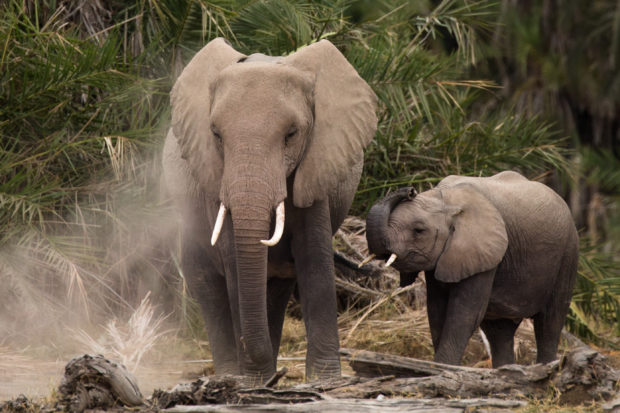
We are grateful to Illinois Governor Bruce Rauner for signing House Bill 4843 into law, making Illinois the ninth state in the U.S. to restrict the sale of ivory and rhino horn products. The poaching of elephants, rhinos, and other imperiled species is one of the major wildlife conservation crises of our lifetime, and every state that takes a stand strengthens the prospects for saving threatened and endangered species. Photo by Cathy Smith
African elephants and rhinos are under the gun; literally. More than 30,000 elephants and 1,000 rhinos are slaughtered by poachers every year for their tusks and horns, respectively. The reason for this war on some of Africa’s most iconic and beloved wildlife is that people are buying ivory trinkets and rhino horn to display their wealth or to consume as health tonics. We are working to put an end to this by advocating for more stringent wildlife protection laws and regulations and by educating the public about the issue so that they will shun these products.
Although elephants and rhinos are protected by federal law, it is legal in many states to sell ivory and rhino horn. That’s why we celebrated when we learned that Governor Bruce Rauner signed House Bill 4843 into law, making Illinois the ninth state in the U.S. to restrict the sale of ivory and rhino horn products. The poaching of elephants, rhinos, and other imperiled species is one of the major wildlife conservation crises of our lifetime, and every state that takes a stand strengthens the prospects for saving threatened and endangered species.
The United States historically has one of the largest ivory markets in the world. Over the years enforcement operations by the U.S. Fish and Wildlife Service and state agencies have brought dozens of traffickers of ivory, rhino horn, and other wildlife to justice and seized illegal wildlife products worth many millions of dollars. Humane Society of the United States investigations have found potentially illegal ivory products widely accessible to the public across the country. Almost none of the ivory dealers our investigators encountered during their most recent look at the trade were able to produce documentation to prove the legality, age, and origins of their ivory products, potentially providing a concerning loophole for illegal elephant ivory to be laundered and sold to unsuspecting customers as antiques.
According to the Great Elephant Census, the first pan-African aerial survey of savanna elephant population, almost 144,000 elephants had perished since 2007, largely due to poaching for their tusks. Rhinos are also under tremendous pressure. In 2017, South Africa lost more than 1,000 rhinos to poaching. There now remain fewer than 29,000 wild rhinos in the world.
We’ve seen some progress in recent years. The Obama administration, for example, significantly restricted the import, export, and interstate sale (across state lines) of African elephant ivory. But as it turns out, states have a crucial role to play in the protection of wildlife species because the federal framework of protection does not restrict or prohibit intrastate sales (sales within a state) of elephant ivory and rhino horns. That’s why the Illinois ivory law is significant: wildlife traffickers now have one less market in which to peddle their illegal wildlife products.
We are grateful for the conservation leadership of Representative Martin Moylan of Des Plaines and Senator Linda Holmes of Aurora, as well as the coalition of animal groups—like the Animal Welfare Institute—that championed the bill and brought it over the finish line.
State ivory and rhino horn bans are valuable to wildlife conservation, as a deterrent to global wildlife trafficking and poaching. We’re looking to other states to rise to the challenge, and to help close out demand and supply of products that lead directly to the slaughter of charismatic animal species at great risk in their home ranges. It’s not too late to save them, and we’re giving our best to that fight.
The post Illinois stands up for African elephants and rhinos appeared first on A Humane Nation.
Enviroshop is maintained by dedicated NetSys Interactive Inc. owners & employees who generously contribute their time to maintenance & editing, web design, custom programming, & website hosting for Enviroshop.
